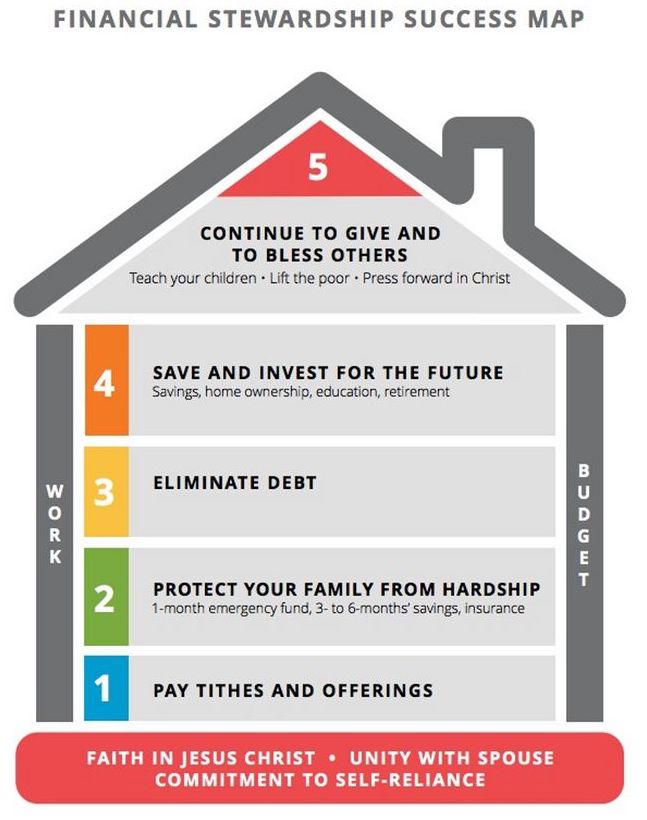
PC 101 Life Skills | Gathering Agenda for Week 05
Welcome everyone to the gathering. Assure the class that you are glad everyone is here and that everyone should feel welcome and accepted.
Consider arriving early to write the scripture references on the board and even to draw out the “Financial Stewardship Success Map” if need be (if you don’t have a way to print it off or share it digitally via a laptop or tablet.
Write the following two scriptures on the board and ask for volunteers to read them out loud:
Read: The Gospel teaches us that when we become spiritually self-reliant, it is our duty to help others to become spiritually self-reliant.
Read: When we become temporally self-reliant (or able to pay for your needs and support yourself), it is also our duty to help others become temporally self-reliant.
Ask for a volunteer to read the following quote from Marion G. Romney:
“There is an interdependence between those who have and those who have not. The process of giving exalts the poor and humbles the rich. In the process, both are sanctified. The poor, released from the bondage and limitations of poverty, are enabled as free men to rise to their full potential, both temporally and spiritually. [Those who have more], by imparting of their surplus, participate in the eternal principle of giving. Once a person has been made whole, or self- reliant, he reaches out to aid others, and the cycle repeats itself” (“The Celestial Nature of Self- Reliance,” Ensign, Nov. 1982, 93).
Review the “Financial Stewardship Success Map” below this document. Each section represents a principle discussed in the lesson.
Discuss the meaning of each section. Ask at least three people to share the biggest thing they have learned from the success map and why.
Invite everyone to set at least one goal on their own related to one area of the success map.
At this point, the lead student, or the missionary, can bear testimony of the power of paying tithes and offerings.
If virtual, use breakout rooms.
During the first part of this lesson, you learned about your responsibility to help those around you to become more spiritually and temporally self-reliant.
For this next activity, divide up into four groups. Give each group the instructions found at the bottom of this document. Then separate for five to ten minutes to allow each group to prepare.
Come back together and then give each group 2-3 minutes to act out their mock conversations using principles taught in the unit. After each group performs, ask the class these two questions. This means that you will ask these questions four times.
Read: As you think about what has been shared tonight, I want to issue a challenge to each of you to write something that touched your heart. What goal do you feel you need to set for yourself as a result of what you learned tonight? Pick just one and work on it throughout the remainder of the week.
Bear a 30-90 second testimony of the importance of financial stewardship. End with a prayer by invitation.
Imagine that a trusted friend comes to you for help. Things are not working out well for him financially. He says he knows he should be paying tithing, but he cannot because he doesn’t have enough money. As a group, discuss what advice you would give this person from this week’s lesson. Be prepared to act out a mock conversation between you and this friend when you come back together as a class. Select 2-3 students from the group to act out how the conversation might go and what advice might be given.
Imagine that a trusted friend comes to you for help. Things are not working out well for him financially. He says he is worried about the potential for hardship that can fall upon his family. He has no savings or insurance, and he is scared. As a group, discuss what advice you would give this person from this week’s lesson. Be prepared to act out a mock conversation between you and this friend when you come back together as a class. Select 2-3 students from the group to act out how the conversation might go and what advice might be given.
Imagine that a trusted friend comes to you for help. Things are not working out well for him financially. He says he is in heavy debt and does not know if he can ever get out of it. As a group, discuss what advice you would give this person from this week’s lesson. Be prepared to act out a mock conversation between you and this friend when you come back together as a class. Select 2-3 students from the group to act out how the conversation might go and what advice might be given.
Imagine that a trusted friend comes to you for help. Things are not working out well for him financially. He says he has no savings of any kind, including retirement. As a group, discuss what advice you would give this person from this week’s lesson. Be prepared to act out a mock conversation between you and this friend when you come back together as a class. Select 2-3 students from the group to act out how the conversation might go and what advice might be given.
